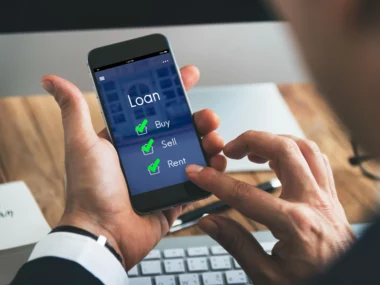Table of Contents
Loans can save one from numerous financial troubles but it is important to know when loans are a good option to use and when they are not.
Loans have always served as a sensible solution to people’s financial crises, as it is an option that allows you to settle your current expenses and worry about payment at a later date.
They have helped many people to achieve major life goals which their regular income wouldn’t have been able to afford.
Although, the benefits of the different types of loans that exist are superfluous, be advised that they are not always the best solution to financial problems.
In this article, we will be discussing the different types of loans, and life situations where loans are a good option to use and when they are not.
What Is a Loan?
A loan is an amount of money lent to a borrower with the agreement of future repayment. The repayment will include the amount that was lent to the borrower (known as the principal) and most of the time an additional amount (known as an interest).
Sometimes, one may have to provide collateral to get the loan. The essence of collateral is to guarantee that the borrower will repay the loan.
Loans come in different shapes and sizes, including secured, unsecured, commercial, and personal loans.
Not only can one get a loan as a one-time deal, it is also accessible as an open-ended line of credit up but has a limit.
How Loans work
Usually, when you need a loan, you make a request by applying to a government-backed lender who approves your loan without taking a look at your financial or credit history, or a private lender who does a thorough perusal of your credit and financial history to determine if you are capable of repaying the loan.
The terms of the loan are set and agreed upon by both the lender and borrower, and then the money is disbursed.
Before granting a loan, there are three main requirements that lenders consider, they include a borrower’s income, credit score, and debt-to-income ratio.
Terms Associated With Loan
If you are not familiar with the lingo of the loan world, the whole process might be a little confusing for you. Check out some of the terms that both lenders and borrowers use while transacting.
1. Principal: This is the actual amount of money that the lender disburses to the borrower as a loan.
2. Interest Rate: This is the rate at which the amount of money that the borrower is owing the lender increases.
3. Loan Payments: This is the amount of money which the borrower is required to pay every week or month towards the repayment of his loan debt.
4. Late Fee: This term is used to describe the charge tacked on a borrower if they don’t pay back the loan on time.
5. Loan Term: This is the length of time that the borrower has to pay back the loan. It is when they exceed this time that the lender imposes a late fee.
6. Collateral: This is an item or a property that is promised to assure the lender of the borrower’s commitment to the repayment of the loan. The item or property is usually forfeited if the borrower fails to pay the lender back.
Types of Loans
Before deciding to get a loan, it is smart to research the different types of loans that we have, so you can pick one that best suits your financial needs. Here are some of the types of loans that we have:
Personal Loan
Personal loans are the type of loans that can be used for different kinds of expenses. These loans can be used for any purpose that a borrower chooses. However, some lenders tag the personal loans that they grant and each of them has their own specific interest rate.
Personal loans don’t usually require collateral. They usually have fixed or variable interest rates and the pay-back date usually ranges from months to several years.
Types of Personal Loans
There are so many types of personal loans but below are some of the most popular ones:
1. Wedding loan: This is the type of personal loan granted specifically for the purpose of executing one’s wedding plans. Personal loans are usually granted as a fixed amount, which means that if you borrow an amount that isn’t sufficient for you, you would have to take out a new loan entirely.
2. Vacation loan: This is the type of personal loan used to care for one’s vacation expenses, especially if one needs a vacation but can’t afford to pay for it at the moment.
3. Holiday loan: This type of personal loan can be used to care for holiday activities such as gift buying, transport costs, and so on.
4. Credit builder loan: This type of personal loan helps to either build a credit history or rectify a bad one.
5. Medical loan: This type of loan helps to relieve the kind of burden which medical expenses can saddle one with.
6. Home improvement loan: This type of loan is taken for the purpose of renovating one’s home or making some necessary improvements.
7. Payday loan: This is a type of short-term personal loan that can be quickly attained to solve one’s financial needs. One of the features of a Payday loan is that you don’t need to put down collateral before you can get it, which means you’re not putting your asset at risk. Also, lenders usually charge higher interest rates compared to some other types of loans.
Auto Loans
The second type of loan that you should be familiar with is Auto Loans. These are the type of loans that you collect for the sold purpose of purchasing a vehicle. It is retarded as a secured loan because the vehicle that you purchase will stand as a collateral, which will be repossessed if you fail to make payments.
The term for these loans often range from three to seven years, and you can get them from credit unions, online lenders, banks, and car dealerships.
Mortgage Loans
This is a type of loan that is taken specifically to purchase a home. You can either get a mortgage loan from private lenders like banks and credit unions or from government-backed lenders. Similar to an auto loan where the vehicle purchased serves as a collateral, the home purchased with mortgage loans are considered by the lender as a collateral, and it can be foreclosed if you fail to make payments.
Student Loans
Just like the name implies, this is a type of loan obtained by students to cater for their tuition, living expenses, and any other education-related expenses. The loan is usually used to pay for the education that you get from a college or at a graduate school. Students have to options when it comes to loan lenders, they either borrow from a private lender or from the federal government. It is usually advisable to get a a federal student loan, as it doesn’t require a credit check and it offers benefits like postponement, forgiveness, and more. A good credit score can get you a favorable interest rate if you borrow from a private lender.
Small Business Loan
This type of loan is taken by entrepreneurs to implement a new business idea or to maintain the one they are currently running. It can be gotten from banks, credit unions, and online lenders, and the interest rate often depends on the lender, and also your credit score.
Pawn Shop Loan
This is a common type of loan where a borrower temporarily relinquishes a piece of property in exchange for cash. The item that is temporarily relinquished serves as a kind of collateral, so this type of loan is regarded as a secured loan, and once the borrower repays the loan, he gets his item back. However, failure to make payment after the payment time has passed grants the lender (pawn shop owner) the right to sell the borrower’s property and keep the money.
Secured vs. Unsecured loans
All the different kinds of loans that we have, exists under two categories: Secured and Unsecured.
1. Secured loan: This is the type of loan that requires a collateral before one can be given. Compared to an unsecured loan, a secured loan is usually easy to get, as the pledge of a collateral assures the lender of your commitment to repayment. The disadvantage of this loan though, is that a borrower risks losing the collateral if he doesn’t make payment.
2. Unsecured loan: This type of loan on the other hand, doesn’t require a collateral before you can get it. Getting this type of loan is a bit hard to get because of the risk it poses to the lender. Since the lender doesn’t request for a collateral, a good credit score gives you a great advantage here, as it helps you get a great interest rate.
Fixed vs. Variable Rates
As it has been established that every type of loan comes with an interest rate, let’s look at the types of interest rates that exists.
1. Fixed rate: Most types of loans have a fixed interest rate. When a loan comes with a fixed interest rate, it means that the interest rate that applies to the loan will neither increase nor decrease for the entire loan term. The advantage here is that the borrower will know the exact amount that it will cost him, which means he can plan accordingly.
2. Variable interest: Unlike fixed rate, when a loan comes with a variable interest rate, it means that the interest rate on the loan will change before before the end of the loan term.
When Loans Are A Good Option To Use?
Before deciding to get any type of loan, it is advisable to consider all your financial options and be absolutely sure that it is the right one for you. To help with this decision, we have compiled a list of situations when loans are a good option to use.
1. Home renovations: When you need to rehabilitate your home, make some repairs, or some improvements but don’t have enough money to do so, getting a home loan can be a good option.
2. Investment: Getting a loan can be a good option if you need to invest in a lucrative business but don’t have the money. It is a good option because you will be using the money borrowed to earn a profit.
3. Personal reasons: Life is unpredictable, which means we can’t always plan for everything that will happen to us. There are times when unavoidable emergency expenses will come up but one won’t have the financial capability to settle them. This is another situation where loans are a good option to use.
4.Debt Consolidation: If you are the type that has always been taking loans upon loans and it suddenly dawned on you that these loans have piled up and you’ve racked up quite a debt, debt consolidation is a loan option that you can use to consolidate all these loans into one to make them more manageable.
5. Medical Emergency: People often put money aside for medical emergency, in the form of medical insurance plan but there are some ailments that your insurance won’t cover. This is also a situation where loans are a good option to use.
6. Moving costs: If you need to move to a new place but don’t have the money to cover expenses such as transport cost, purchasing new furniture, painting the new place, and other related expenses, loans can be a good option to use.
7. Large purchases: Purchasing a vehicle or a landed property usually costs a lot but sometimes it is a necessity that we can’t avoid. If you find yourself in this position, getting a loan with an attractive interest rate can be a good option.
8. Wedding expenses: Getting your dream wedding is probably not going to be cheap so you might need to spend all that you have in your savings. However, if your savings is not something you can spend like that, you could always consider getting a loan to cover your wedding expenses.
When Are Loans Not A Good Option To Use?
We’ve discussed situations where getting a loan will do you a lot of good and help you out of financial crisis but let’s also take a look at some of the times when you should not consider getting a loan.
1. Monthly payments: Don’t consider getting a loan if your income is not sufficient for you to afford monthly loan payments.
2. Bad credit score: As it has been established, for you to get most loans, your credit score would be considered, and in cases where you have a bad credit score, the interest rate on your loan might be really high. This is not the time to get a loan, as it might end up saddling you with a giant interest rate that you will be paying off for a long time.
3. Huge amount of debt: This probably goes without saying but if you already have a great deal of debt that you’re struggling to settle, getting a loan might not be a good option for you, as this will only add to the existing debt and put you in a worse financial position.
4. To fund a lifestyle: Getting a loan to fund a lifestyle is a terrible idea, as all it will do is help you rack up a mountain of debt. If you need to keep up a particular lifestyle, work and earn the money to fund it, don’t take a loan.
5. Unfavorable terms: If the terms of the loan are unfavorable, don’t consider taking it. For example, some loans often come with a ridiculously high interest rates, either because you don’t have a good credit score or because that is the nature of the loan. Whichever one it is, it is not advisable to take such loans, to avoid debt.
To summarize:
Loans can be lifesavers but they are not always the smartest choice of financial solution. We hope this article has provided you with enough information to know when loans are a good option to use and when they are not.






